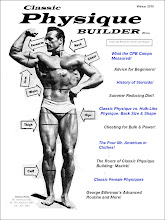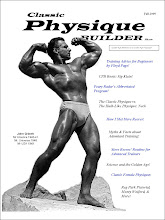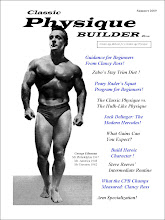 (Photo Above: The Cover of Steve Reeve's Other Book "Dynamic Muscle Building.")
(Photo Above: The Cover of Steve Reeve's Other Book "Dynamic Muscle Building.")Most people who are interested in classic physique building know Steve Reeves and might know about his book "Building the Classic Physique: The Natural Way." But perhaps fewer people know that Steve authored another book called "Dynamic Muscle Building."
This is a really good book that collects together many of the articles that Steve wrote in the Golden Age for some of Joe Weider's magazines. The first few chapters start off by providing routines for beginners, intermediates, and advanced trainers. These chapters are followed by chapters on specialized training (for different parts of the body). The remaining chapters reprint articles and interviews that Steve did. One of these articles is "How I Gained 19 Pounds in Two Weeks" - which is a true story that illustrates the power of muscle memory when it comes to regaining lost muscle.
The book is available through the Steve Reeves International Society (see our links) and probably through the regular channels (Amazon.com, etc). The book was actually published after Steve passed away and so John Little and George Helmer are listed as co-authors. So there may be some slight additions here and there that come from John or George and not from Steve. But when I compare the book to the original writings that Steve did in the Golden Age (from which this book is assembled), I can say that any such additions are very minor.
So, if you have the change, pick up the book! It is a must for any CPB'er!
- CPB
P.S. If you would like a free, 1 year subscription to Classic Physique Builder zine (CPBzine) - a pdf "zine (do-it-yourself magazine) that is patterned after the mags of the Golden Age of Bodybuilding (the 1940s and 50s) - just email your name, the name of your city, state, and country (not your actual street address) to cpbzine@gmail.com. That's it! Any info you send us is strictly confidential. You won't get on any lists or receive any spam (even from us)!


































